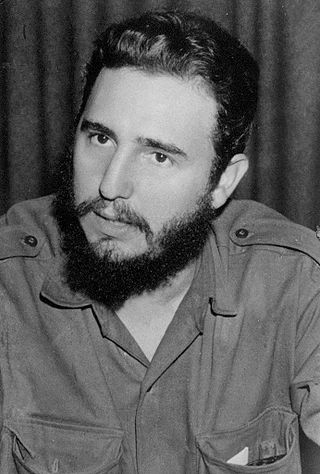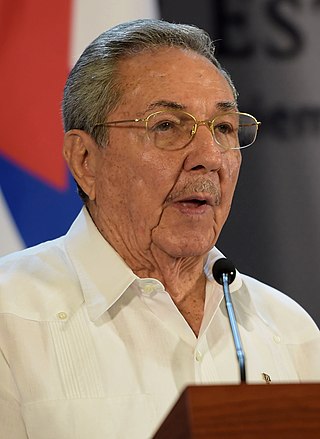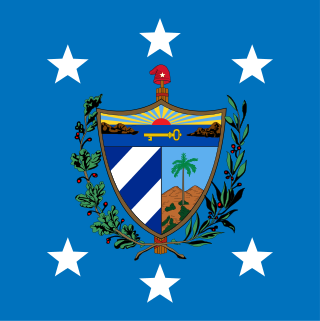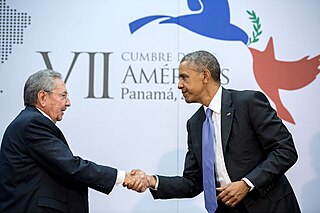| |||||
| Decades: | |||||
|---|---|---|---|---|---|
| See also: | |||||
The following lists events that happened during 2015 in Cuba .
| |||||
| Decades: | |||||
|---|---|---|---|---|---|
| See also: | |||||
The following lists events that happened during 2015 in Cuba .

Fidel Alejandro Castro Ruz was a Cuban revolutionary and politician who was the leader of Cuba from 1959 to 2011, serving as the prime minister of Cuba from 1959 to 1976 and president from 1976 to 2008. Ideologically a Marxist–Leninist and Cuban nationalist, he also served as the first secretary of the Communist Party of Cuba from 1961 until 2011. Under his administration, Cuba became a one-party communist state; industry and business were nationalized, and socialist reforms were implemented throughout society.

Cuba has had a socialist political system since 1959 based on the "one state – one party" principle. Cuba is constitutionally defined as a Marxist–Leninist state. The present Constitution of Cuba, which was passed in a 2019 referendum, also describes the role of the Communist Party of Cuba to be the "leading force of society and of the state" and as having the capability of setting national policy, and First Secretary of the Communist Party is the most powerful position in Cuba. The 2019 Constitution of Cuba identifies the ideals represented by Cuban independence hero José Martí and revolutionary leader Fidel Castro as the primary foundation of Cuba's political system, while also stressing the importance of the influence of the ideas of Marx, Engels, and Lenin.

"State Sponsors of Terrorism" is a designation applied by the United States Department of State to countries which the Department alleges to have "repeatedly provided support for acts of international terrorism". Inclusion on the list enables US government to impose four main types of unilateral sanctions: restrictions of foreign aid, ban of weapons sales, export controls of dual-use equipment and other miscellaneous economic sanctions. The State Department is required to maintain the list under section 1754(c) of the National Defense Authorization Act for Fiscal Year 2019, section 40 of the Arms Export Control Act, and section 620A of the Foreign Assistance Act.

Raúl Modesto Castro Ruz is a Cuban retired politician and general who served as the first secretary of the Communist Party of Cuba, the most senior position in the one-party communist state, from 2011 to 2021, and President of Cuba between 2008 and 2018, succeeding his brother Fidel Castro.

The president of Cuba, officially the president of the Republic of Cuba, is the head of state of Cuba. The office in its current form was established under the Constitution of 2019. The President is the second-highest office in Cuba and the highest state office. Miguel Díaz-Canel became President of the Council of State on 19 April 2018, taking over from Raúl Castro, and has been President of Cuba since 10 October 2019.

Cuba and the United States restored diplomatic relations on July 20, 2015, after relations had been severed in 1961 during the Cold War. U.S. diplomatic representation in Cuba is handled by the United States Embassy in Havana, and there is a similar Cuban Embassy in Washington, D.C. The United States, however, continues to maintain its commercial, economic, and financial embargo, making it illegal for U.S. corporations to do business with Cuba.

Mariela Castro Espín is the director of the Cuban National Center for Sex Education in Havana, as well as the National Commission for Comprehensive Attention to Transsexual People, and an activist for LGBT rights in Cuba. Castro is an outspoken advocate for the LGBT+ community as well as dissolving some of the antiquated stigmas and stereotypes that surround the community. She is the daughter of former Communist Party First Secretary Raúl Castro and feminist and revolutionary Vilma Espín, and the niece of former First Secretary Fidel Castro.
The 2006–2008 Cuban transfer of presidential duties was the handover of the title of president and presidential duties from longtime Cuban leader Fidel Castro to his brother Raúl Castro, the next-in-line-of-succession person in Cuba, following Fidel's operation and recovery from an undisclosed digestive illness believed to be diverticulitis. Although Raúl Castro exercised the duties of president, Fidel Castro retained the title of President of the Council of State of Cuba and President of the Council of Ministers of Cuba, during this period.
Carlos Aurelio Lage Dávila is a Cuban politician. Until 2009, he was a Vice President of the Council of State of Cuba, a member of the Politburo of the Communist Party of Cuba, and Executive Secretary of the Council of Ministers of Cuba. Lage was described as Cuba's de facto prime minister.

Relations between Cuba and Venezuela were established in 1902. The relationship deteriorated in the 1960s and Venezuela broke relations in late 1961 following the Betancourt Doctrine policy of not having ties with governments that had come to power by non-electoral means. A destabilizing factor was the Cuban support for the antigovernment guerrilla force that operates in remote rural areas. Venezuela broke off relations with Cuba after the Machurucuto invasion in 1967, when Cuban trained guerrillas landed in Venezuela seeking to recruit guerrillas and overthrow the government of Raúl Leoni. Relations were reestablished in 1974.

José Ramón Machado Ventura is a Cuban revolutionary and politician who was the First Vice President of the Council of State of Cuba from 2008 to 2013. With the election of Raúl Castro as President of Cuba on 24 February 2008, Machado was elected to succeed him as First Vice President, serving until 2013. He was elected Second Secretary of the Communist Party of Cuba in 2011.

Miguel Mario Díaz-Canel y Bermúdez is a politician and engineer who is the 3rd and current first secretary of the Communist Party of Cuba. As first secretary, he is the most powerful person in the Cuban government. Díaz-Canel succeeds the brothers Fidel and Raúl Castro, making him the first non-Castro leader of Cuba since the revolution. Díaz-Canel's leadership thus represents a non-dynastic form of succession for the party as well as for the state, and the end of Castro leadership in Cuba.

The First Secretary of the Central Committee of the Communist Party of Cuba is the de facto leader of Cuba. The First Secretary is the highest office within the Communist Party of Cuba as well as ranking first in the Politburo, the highest decision-making body in Cuba, which makes the office holder the most powerful person in the Cuban government. In communist states the First or General Secretary of the Communist Party is typically the de facto leader of the country and a more powerful position than state offices such as President or Prime Minister, when those positions are held by different individuals. From 1961 until 2011, the position of First Secretary was held by Fidel Castro, who was Prime Minister of Cuba and, until 2008, President of the Council of State. Miguel Díaz-Canel, who has been President of Cuba since 2019, was elected First Secretary of the Communist Party on 19 April 2021, succeeding Raúl Castro, who was First Secretary from 2011 until 2021. The post was named in imitation of the title of First Secretary of the Communist Party of the Soviet Union, which was used by Nikita Khrushchev and, briefly, Leonid Brezhnev.


The Cuban thaw was the normalization of Cuba–United States relations that began in December 2014 ending a 54-year stretch of hostility between the nations. In March 2016, Barack Obama became the first U.S. president to visit Cuba since Calvin Coolidge in 1928.
Raúl Castro is the former President of State Council of Cuba (2008–2018) and current First Secretary of the Communist Party of Cuba (2011-present).
Events in the year 2017 in Cuba.
Events in the year 2018 in Cuba.

Cuba–France relations are the diplomatic relations between Cuba and France. Both nations are members of the United Nations.
This article covers events in the year 2021 in Cuba.